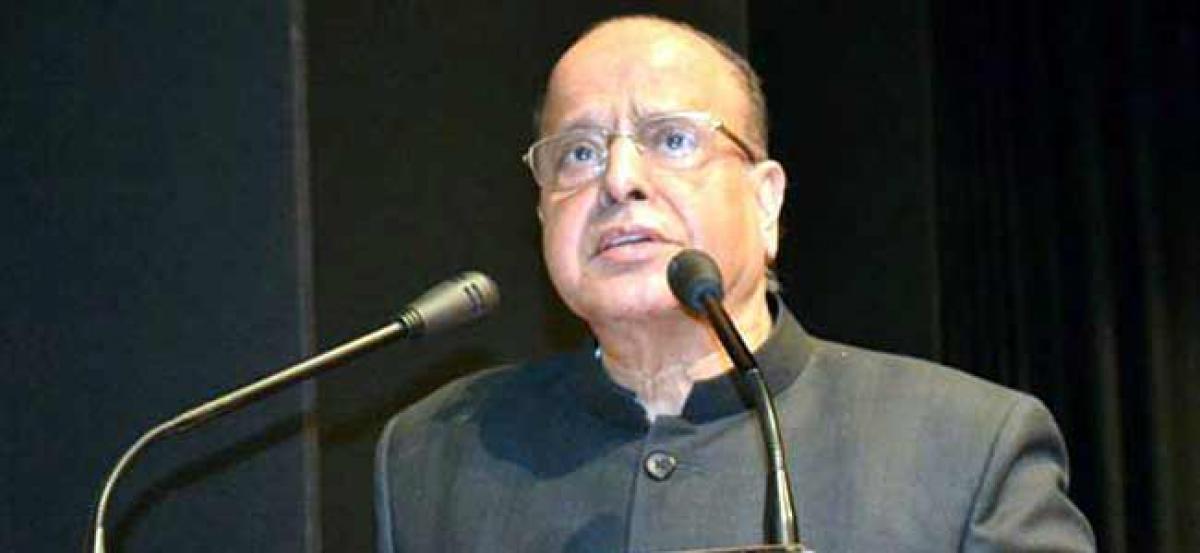Live
- Mohan Babu Questions Media Ethics in Emotional Audio Message
- Chandrababu Congratulates Gukesh on Historic Chess Achievement
- How Long Can You Safely Wear Makeup?
- ED conducts raids at two places in Bengal in chit fund case
- BJP Tamil Nadu President Expresses Confidence In Resolving Tungsten Mining Concerns In Madurai
- Karnataka Reviews Lake Safety Ahead of Monsoon: Minister Bhosaraju Tells Upper House
- Udupi MP’s queries, More key highways on high-priority
- Investing in Skills: Education Loans Paving the Way for Career Success
- Ghaggar river’s two stretches identified as polluted: Govt
- ICC chief Jay Shah meets Brisbane 2032 Olympics organising committee CEO
Just In
Groom the young to take interest in astronomy: Kasturirangan


Indian students can reach for the skies if an interest in astronomy is instilled in them right from their school days, former Indian Space Research Organisation (ISRO) chief K Kasturirangan has said.
For India to be “right in the forefront” of astronomy, it is important to draw the interest of the youth. We need a large number of youngsters from the university system, institutions, observational institutes, he stresses
To generate interest in astronomy among the youth, the government should promote activities right from the schools, in colleges as well as universities and other research areas
Kolkata: Indian students can reach for the skies if an interest in astronomy is instilled in them right from their school days, former Indian Space Research Organisation (ISRO) chief K Kasturirangan has said.
He said, India would be one of the leaders in the field of astronomy in the future. "I think this is an extraordinary period of astronomy for India but what is important now is that we need to groom the younger generation to take an interest in astronomy, to bring them into astronomy and do justice to all the investments we are making," Kasturirangan said.
For India to be "right in the forefront" of astronomy, it was important to draw the interest of the youth, he told PTI.
Predicting that planetary explorations would further grow in the coming years, the scientist said there was a great scope for youngsters in this field. To generate interest in astronomy among the youth, the government should promote activities right from the schools, in colleges as well as universities and other research areas, he said.
"I think even areas such as planetary explorations will further grow. And so there is a lot of scope and a lot of excitement in this but the youngsters have to be motivated... right from the schools. We should promote astronomical activities in the universities, research areas, institutions.
We need a large number of youngsters from the university system, institutions, observational institutes," he stressed. Asked if India was capable of taking up space expeditions and research works on its own, Kasturirangan said ISRO would need to partner other nations after a certain point.
"I would say up to a point India is capable of taking up space expeditions single-handedly. But I think at a certain stage India must move towards international collaboration and cooperation.
"Chandrayaan had six instruments from abroad and six from India... I am sure that future Mangalyan and other planetary explorations will have (collaboration). And afterwards I believe we will be a part of an international expedition to planetary exploration," Kasturirangan said. He, however, advised the government not to go in for loans to facilitate space research programmes. “We should not take loans because investments are very large and the resources can be very demanding.
And I don’t think there is any reason why we should when the international community also looks to collaboration with India because Indians are easy to collaborate with, are capable and can contribute substantially to major programmes.
We have demonstrated that in the past,” the space scientist said. Underlining India’s strong presence in international space programmes, the Padma Vibhushan awardee of 2000 predicted tremendous opportunities for the country in this field.
He referred to India's participation in the Thirty Metre Telescope (TMT) project, a proposed astronomical observatory, mentioned the Square Kilometre Array, a large multi radio telescope project and said India was a partner for the Laser Interferometer Gravitational-Wave Observatory (LIGO) to detect cosmic gravitational waves.
"I think others will come here and they will be partners here of an Indian-inspired thing. And may be tomorrow there will be an astrostat in which others will come and participate. So just look at the things we are doing. So I think there is tremendous opportunity and the international community is very much inclined to do this,” he stated.
Sudipto Chowdhury

© 2024 Hyderabad Media House Limited/The Hans India. All rights reserved. Powered by hocalwire.com






